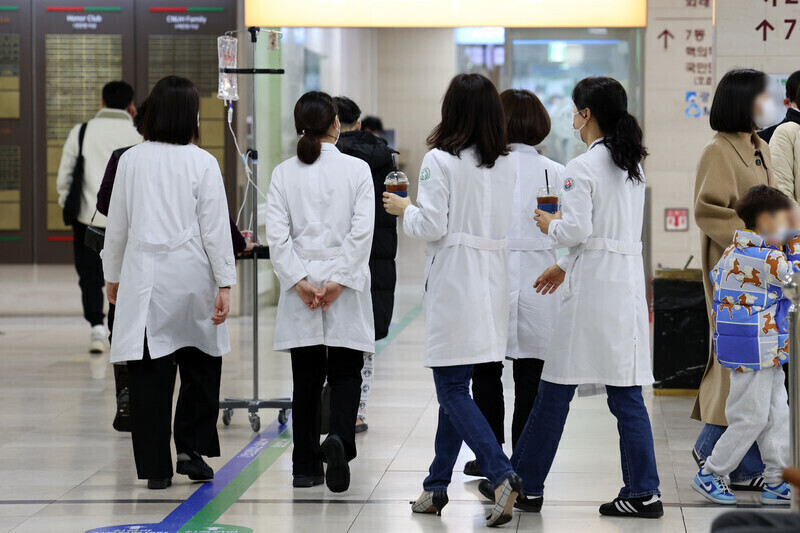hankyoreh
Links to other country sites 다른 나라 사이트 링크
Korean med schools swallow bitter pill by pushing back classes to avoid mass flunking

After President Yoon Suk-yeol reiterated his intention to create 2,000 more placements at Korean medical schools on Monday, the medical education community said that measures must be taken to guarantee that the quality of education does not suffer as a result of an increase in students. Universities with medical programs are also struggling as medical students boycott their classes for a second month.
“Since lowering the quality of education can endanger patients’ safety, maintaining the quality of medical school education should be a prerequisite for increasing placements at medical schools,” the Korean Society of Medical Education said in a statement on Monday.
The society also said it is essential to devise a detailed educational strategy to accommodate increased admissions at medical schools.
“The methods and strategies for education in basic theory and clinical practice must be planned in detail according to the number of increased placements. If we are to encourage more doctors to work in rural areas and provide essential medical services, the selection of medical school students and career instruction are also major considerations,” the academic consortium emphasized.
Universities with medical programs have been placed in an awkward position by medical students’ walkout in solidarity with the trainee doctors. The walkout began on Feb. 19 and is now well into its second month. Applications for leaves of absence have continued to rise, with a total of 10,242 students having applied as of March 31, accounting for 54.5% of all students enrolled in medical colleges across Korea.
Colleges are refusing to approve these requests for leaves of absence in accordance with a Ministry of Education guideline that says organized collective leaves of absence do not fall under legitimate grounds for eligibility. Instead, schools have continued to push back the start of the regular school year so as to prevent students from automatically failing their courses due to lack of attendance, which would force them to repeat a grade.
Chung-Ang University College of Medicine has pushed back the first day of classes two times already, to March 8 and then April 1, and has recently pushed it back even later, to May 1. Sungkyunkwan University School of Medicine had been scheduled to start courses in February, but has moved to extend the winter break instead, and plans to begin the semester on April 15.
Yet some at medical schools argue that colleges should approve students’ requests for leaves of absence. Their reasoning is a concern that if students do indeed flunk this school year or semester, they not only will not be entitled to refunds on their tuition, but they will be left with a mark on their permanent record, which could put them at a disadvantage down the road.
“It’ll only take one or two weeks for students to start being failed if classes are commenced again, so we’d be better off signing off on leaves of absence,” said Kang Yune-sik, the dean of the Gyeongsang National University College of Medicine.
One source at Chosun University told the Hankyoreh that schools will “have no option but to consider” approving leaves of absence “when the time comes.”
Still, the Ministry of Education remains firm in its stance that leaves of absence of this sort cannot be authorized.
“It is the government’s position that leaves that occur not due to extenuating circumstances that make carrying on with one’s studies difficult but as part of a general boycott are not eligible for authorization,” said Ministry of Education spokesperson Koo Yeon-hee.
By Kim Min-je, staff reporter; Park Go-eun, staff reporter
Please direct questions or comments to [english@hani.co.kr]

Editorial・opinion
![[Column] When ‘fairness’ means hate and violence [Column] When ‘fairness’ means hate and violence](https://flexible.img.hani.co.kr/flexible/normal/500/300/imgdb/original/2024/0516/7417158465908824.jpg) [Column] When ‘fairness’ means hate and violence
[Column] When ‘fairness’ means hate and violence![[Editorial] Yoon must stop abusing authority to shield himself from investigation [Editorial] Yoon must stop abusing authority to shield himself from investigation](https://flexible.img.hani.co.kr/flexible/normal/500/300/imgdb/original/2024/0516/4417158464854198.jpg) [Editorial] Yoon must stop abusing authority to shield himself from investigation
[Editorial] Yoon must stop abusing authority to shield himself from investigation- [Column] US troop withdrawal from Korea could be the Acheson Line all over
- [Column] How to win back readers who’ve turned to YouTube for news
- [Column] Welcome to the president’s pity party
- [Editorial] Korea must respond firmly to Japan’s attempt to usurp Line
- [Editorial] Transfers of prosecutors investigating Korea’s first lady send chilling message
- [Column] Will Seoul’s ties with Moscow really recover on their own?
- [Column] Samsung’s ‘lost decade’ and Lee Jae-yong’s mismatched chopsticks
- [Correspondent’s column] The real reason the US is worried about Chinese ‘overcapacity’
Most viewed articles
- 1Could Korea’s Naver lose control of Line to Japan?
- 2[Column] Welcome to the president’s pity party
- 3[Column] US troop withdrawal from Korea could be the Acheson Line all over
- 4Naver’s union calls for action from government over possible Japanese buyout of Line
- 5[Editorial] Korea must respond firmly to Japan’s attempt to usurp Line
- 6Korea cedes No. 1 spot in overall shipbuilding competitiveness to China
- 7[Editorial] Yoon must stop abusing authority to shield himself from investigation
- 8[Column] When ‘fairness’ means hate and violence
- 9Korean opposition decries Line affair as price of Yoon’s ‘degrading’ diplomacy toward Japan
- 10Second suspect nabbed for gruesome murder of Korean in Thailand, 1 remains at large